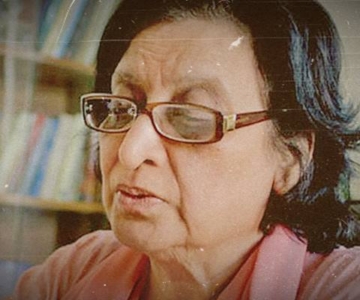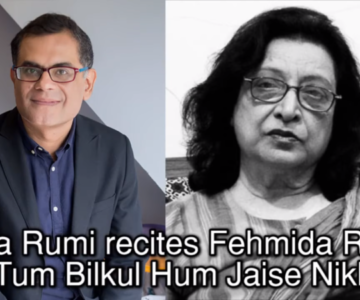Barricaded Islamabad enveloped by the ghosts of national gloom has one little corner of hope. The Pakistan Academy of Letters, under its dynamic and committed Chairman, Fakhar Zaman, continues to weave narratives that still inspire. Even when the bitterness of our grim present affects us all, Fakhar Zaman was forthright in his views on Pakistan, its future and most importantly, its literary tradition. The venue was the book launch of Fahmida Riaz’s novel Godavari that has been translated into English. Fahmida Riaz is better known as a poet but her unique prose is lesser known. Her short stories and novels are extraordinary pieces of literary works rendered into sheer poetry. Often it is difficult to determine the genre of her ‘prose’ works as the lines between watertight compartments blur and fade away, only to reappear as a gentle reminder to the readers that our author is experimenting in her inimitable style.
Godavari was published last year by the Oxford University Press and Fakhar Zaman organised its launch under the aegis of PAL only to ensure that there are many indigenous, native voices in English that have yet not caved in to the pressures and inducements of Western publishing houses. Godavari is a deceptively simple story of a few characters visiting a holiday hill resort in Maharashtra a little before the communal riots that shook Bombay and India in the 1980s. But deep within its lines, sub-textual connotations and shifting moods lie tales of discrimination, communal hatred and the unfettered spirits of its universal female characters. The heartening aspect of this book launch was that there were a few dozen enthusiasts present on the occasion, and a few powerful intellectuals who spoke of Fahmida’s life and her works as symbolic of contemporary Pakistan.
Dr Tariq Rehman cited the two-fold menace of snowballing Talibanisation; and the silence that had gripped ‘the mentally exiled’ who ought to rise and confront it
The most forceful of voices at PAL was that of Dr. Tariq Rehman, the eminent linguist who was quick to clarify that he was neither a literary critic nor a connoisseur but had only come there in support of relentless fighters such as Fahmida Riaz who had devoted their lives to the cause of a progressive Pakistan. Dr. Rehman spoke of the challenges that Pakistan faced, and reminded everyone how these had been subtly and deftly handled by Riaz in her novel. Of all these challenges he cited the two-fold menace of snowballing Talibanisation; and the silence that had gripped those – mentally exiled – who ought to rise and confront it. Dr. Rehman was deeply worried, forceful in his presentation and sincere in his warnings that we all facing certain dangers together as a nation that has been betrayed time and again by its ruling elites.
Dr. Mujahid Barelvi, the eminent journalist, reminisced about the younger Fahmida in Karachi of the 1970s, and how she inspired younger writers. Her infinite charms made a whole generation fall in love with her. He cited the upheavals of the 1970s and the onset of martial law, Fahmida’s exile and how the dreamers saw their ideals crashing one after another during General Zia-ul-Haq’s monstrous rule.
Godavari was written when Fahmida Riaz was in exile in India during the 1980s. This was the time when she had a relatively safe environment, for she had been booked under the sedition law in Pakistan. However, this was also a time when Fahmida was not at home in the promised secular land because of its deep-seated casteism, its roving communal demons and above all, its typecasting of Pakistanis. Therefore, Godavari also emerges as a tale of an exile as much as it is about the marginalisation of women and India’s lower castes.
Salman Asif read an erudite paper, almost a literary tribute to our greatest living poet. He spoke of the inherent lyricism of Fahmida’s prose and its overt feminist stance and intonations. He quoted verses from Dara Shikoh and ended his paper with moving lines from Forugh Farrokhzad, the legendary Iranian poet who was also castigated by the prophets of chauvinism and ignorance. Alamgir Hashmi spoke about Godavari’s plot, its characters and genre, and raised numerous questions about the difficulty of categorizing it. Shabnam Shakil and Kishwar Naheed also attended the ceremony as guests and reaffirmed their solidarity with Riaz.
There was nothing more endearing than hearing the sari-clad and reflective Fahmida Riaz, speaking in English about her novel and answering many questions. She also set its context, and mentioned how Sir Sayid’s message on education and modernization was still relevant and perhaps the best counterweight to the growing extremism in the country. Fahmida was also emphatic in affirming our South Asian identity as the founders and creators of Pakistan were themselves “Indians” and not foreigners. Thus she lambasted the insidious efforts of the Pakistani state to impose a foriegn identity on us, basing it on alien regions and cultures. In spite of such realities, she emphasized, we were distinctly Pakistani and this was the beauty of our country’s pluralism, which is now at the mercy of fundamentalist obscurantism. She looked calm and satisfied at the translation rendered by Aquila Ismail, not to mention an excellent introduction by Pakistan’s gifted bilingual writer Asif Farrukhi. In his eloquent background to the novel and its author, he cited the incident when Fahmida’s house was searched during Zia’s era and the house “begins to appear in a new light as she begins to hear, for the first time, heartbeats reverberate through the four walls:”
All these tribulations over a book
Hidden in my past?
Look beyond the curtains instead
At my dreams of the future‘
– Search Warrant’ translated by Patricia Sharpe
The chair, Fakhar Zaman, was the most unconventional speaker I have ever heard at such literary events. He delivered an insightful, self-exploratory speech. Tired of hearing about Iqbal’s religiosity, Zaman complained of how desperadoes were searching for religion in Faiz too. He was quick to confess that he was a political worker, but his primary identity was that of a writer. Through this curiously hybridized identity, he understood Fahmida’s works, related to her anguish and shared her concerns for Pakistan’s past and its uncertain future. He also spoke of the ludicrousness of visa barriers in South Asia and the demeaning immigration forms that placed writers, poets and intellectuals in a category titled as the “other”. The audience laughed and also ruminated as he spoke extempore without fear and without cavil. Fakhar Zaman is a rare breed of intellectual, and it is good to see the Academy thriving under his leadership despite the turbulent environs of the mighty capital.
It is a separate matter that we have learnt to sit in comfortable zones of apathy concerning our writers. Thousands of employees recruited by the past PPP governments have been reinstated, but Fahmida Riaz stays in her Karachi apartment without a vocation or decent livelihood that would enable a litterateur of her towering stature to create more art. For all its other acts of omission, the present government will not be kindly remembered if it fails to honour the progressive artists who struggled against dictatorships and lost their homes, dreams and moorings. Perhaps this is why we are condemned to be haunted by the ghosts of authoritarian rule and the shadows of anti-human ideologies.
Fahmidaji, keep on writing: posterity is all yours. This is what your predecessors Mir and Ghalib and many others faced. We are incapable of breaking the callous circles of indifference.
Raza Rumi blogs at http://www.razarumi.com and edits Pak Tea House and Lahornama e-zines
Published in The Friday Times



